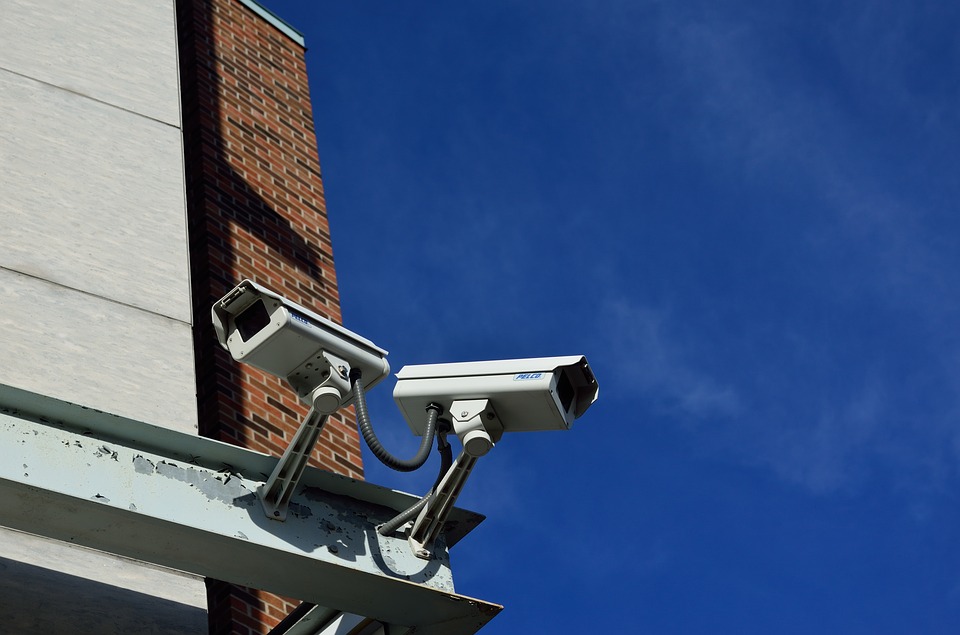Supervisors Concerned About Facial Recognition Technology
Six supervisors support county policy with strict limits on use of technology.

Security cameras. (Pixabay License).
A new Milwaukee County Board resolution tries to shed light, and potentially slow down, the county’s adoption of facial recognition technology.
The resolution, introduced by Sup. Juan Miguel Martinez, and co-sponsored by five other supervisors, sketches out concerns that facial recognition technology could be used to violate civil rights or suppress speech and requests development of a county facial recognition policy before the technology is adopted further by county government.
Martinez told Urban Milwaukee he is concerned the technology will be used to surveil and suppress protected speech and political activity, and that it will be used to target minority communities.
“I’m vehemently opposed to facial recognition technology, and I just want to make sure that everybody knows that, and I want to make sure that we as the county put forward more viable solutions,” Martinez said. “This kind of stuff doesn’t solve anything, all it does is criminalize more and more people, and it starts to wrongfully, criminally accuse more and more people.”
The county board has limited authority to direct policy, especially for anything that falls within the realm of the Milwaukee County Sheriff‘s Office (MCSO). The resolution requests the county pause any further adoption of facial recognition technology until a countywide policy can be adopted.
Martinez wants the county’s Office of Corporation Counsel to work with the MCSO and the Information Management Services Division (IMSD) to develop a policy that outlines when facial recognition can and can’t be used, sets strict limits on data collection and retention and creates a transparent process for oversight of the technology and its use by the county.
Specifically, Martinez’s resolution seeks prohibition of facial recognition technology without consent from the person being scanned, except in “narrowly defined” situations like a criminal investigation; define and limit the data captured using the technology, and establish rules for how long the data is kept and when it will be deleted; prohibit sharing facial recognition data with third parties unless “authorized through a rigorous, transparent approval process subject to oversight;” and require departments using the technology to submit reports on its use, “including metrics on deployment, effectiveness, and an analysis of potential disparate impacts on communities of color, immigrants, and other vulnerable populations.”
Members of the Milwaukee Common Council and civil rights organizations recently raised concerns about the Milwaukee Police Department‘s (MPD) use of facial recognition technology, as Urban Milwaukee reported. A May letter signed by 10 members of the council said “Facial recognition systems are prone to errors, with studies showing higher misidentification rates for people of color, women and other marginalized groups.”
MPD plans to provide a software company called Biometrica with 2.5 million mugshots in exchange for free access to its technology. The department has already been quietly using the technology, having other law enforcement agencies search their databases, according a report by MPD Chief of Staff Heather Hough to the Milwaukee Fire and Police Commission. That includes the sheriff’s office, which has used Biometrica’s facial recognition technology at least 50 times, allegedly identify 48 suspects in the process.
The MCSO did not respond to questions about its use of Biometrica technology. The company, which has offices in Arizona and Nevada, did not respond to requests for an interview with Urban Milwaukee.
The American Civil Liberties Union of Wisconsin and more than a dozen other civic organizations and advocacy groups want the Common Council to stop MPD from implementing facial recognition technology. The coalition is requesting the adoption of a Community Control over Police Surveilance (CCOPS) ordinance, which would “democratize the decision-making process” for surveillance technology and practices in Milwaukee. That includes Common Council approval before any new technology is implemented and annual reports on how it was used.
The proposed CCOPS provisions echo what Martinez is requesting at the county level. Supevisors Justin Bielinski, Anne O’Connor, Steven Shea, Jack Eckblad and Caroline Gómez-Tom have already co-sponsored the resolution. It will get its first hearing on June 17 during the board’s Committee on Judiciary, Law Enforcement and General Services.
If you think stories like this are important, become a member of Urban Milwaukee and help support real, independent journalism. Plus you get some cool added benefits.
MKE County
-
Fellow Judge Testifies in Dugan Case
 Dec 16th, 2025 by Graham Kilmer
Dec 16th, 2025 by Graham Kilmer
-
Key Questions in Dugan Trial Take Shape on First Day
 Dec 15th, 2025 by Graham Kilmer
Dec 15th, 2025 by Graham Kilmer
-
FTA Tells Milwaukee to Crack Down on Fare Evasion — Even Where Fares Don’t Exist
 Dec 12th, 2025 by Graham Kilmer
Dec 12th, 2025 by Graham Kilmer





















Mayor Johnson could learn something from Martinez here.
Not looking forward to the red light camera data being sold off to ICE and other cop agencies.
ALL of this data is going to be used against folks. Calling a spade a spade!
Again, in the “big beautiful bill” there is a 10 year moratorium on local governments regulating AI. It may become a moot point what county supervisors think.
From the Biometrica homepage regarding the benevolent nature of their software,
“Every alert passes through a trained human reviewer, ensuring oversight, context and dignity”.
Hilarious.